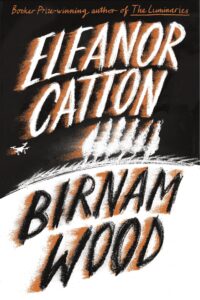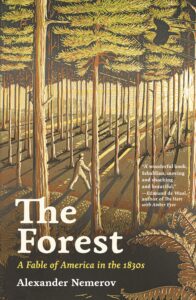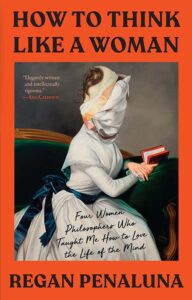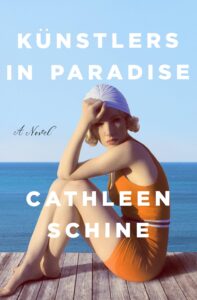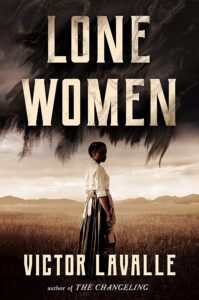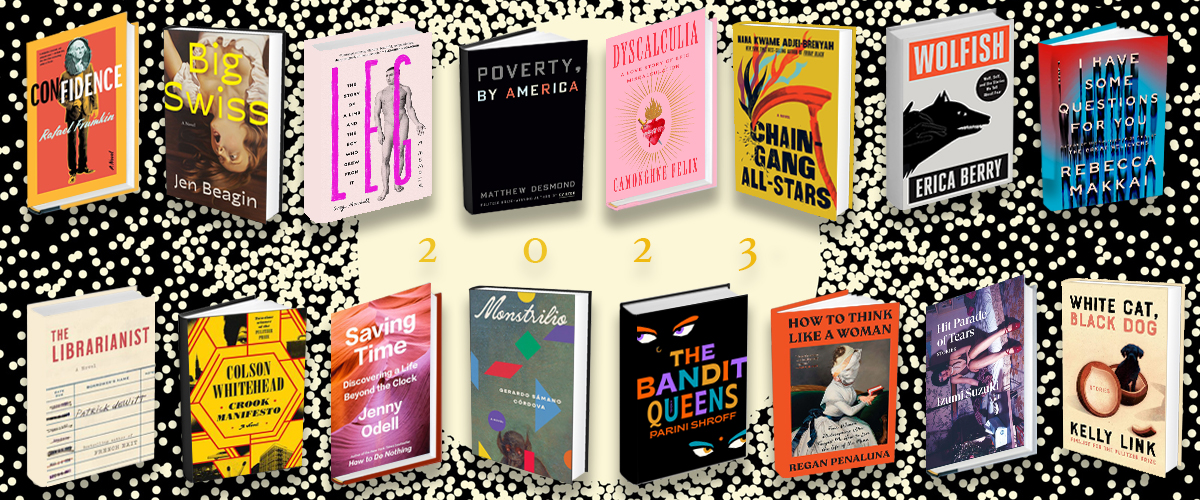
Lit Hub’s Most Anticipated Books of 2023
218 Books We’re Looking Forward to Reading This Year
MARCH
Eleanor Catton, Birnam Wood
FSG, March 7
This is a psychological thriller about gardening. Yes, that’s right: Guerrilla gardeners who call their group Birnam Wood! An enigmatic billionaire supposedly building an end-times bunker! A town cut off from the rest of the world! From the author of the mesmerizing, Booker Prize-winning The Luminaries! I cannot wait to read it. –ET
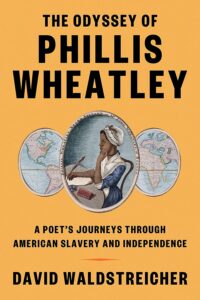
David Waldstreicher, The Odyssey of Phillis Wheatley: A Poet’s Journeys Through American Slavery and Independence
FSG, March 7
If anyone needed further proof that the incredible life of Phillis Wheatley deserves its own blockbuster prestige TV series they need look no further than David Waldstreicher’s 500-page biography. Kidnapped as a child from West Africa and forced into slavery in Boston, Wheatley soon displayed an uncanny talent for languages, writing poetry and polemics that would see publication in New York, Boston, and as far away as London. And not just pretty verse—Wheatley didn’t shy away from the politics of the day, no matter how contentious, earning the praise of George Washington (and scorn of Thomas Jefferson). –JD
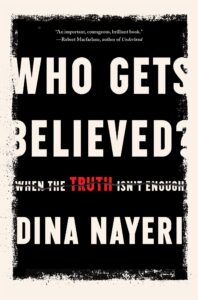
Dina Nayeri, Who Gets Believed?: When the Truth Isn’t Enough
Catapult, March 7
Dina Nayeri’s previous book, The Ungrateful Refugee, was a vital work about the refugee experience. She wove her own story of fleeing Iran with those of other refugees and asylum seekers to create a work of great complexity and humanity. In Who Gets Believed?: When the Truth Isn’t Enough, Nayeri turns her keen eye to issues of honesty and persuasion, through her own stories and those of others, including asylum seekers, exonerated felons, and others whose lives have been shaped by questions of belief and credibility. Robert McFarlane calls it “an important, courageous, brilliant book… a form-shifting memoir of an already-remarkable life, and a moving, harrowing investigation of love, loss and care.” –JG
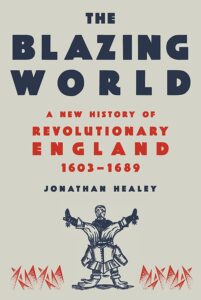
Jonathan Healey, The Blazing World: A New History of Revolutionary England, 1603-1689
Knopf, March 7
Yes, I am unreasonably excited about this 500-page history of 17th-century England, an era of plots and revolutions and uprisings that presaged the emancipatory shockwaves of the next few hundred years. From the Gunpowder Plot to the Civil War to the radical dissent of movements like the Diggers, the chaos and drama of England’s 17th-century is as entertaining as it is enlightening about the origins of the modern West. I am ready. –JD
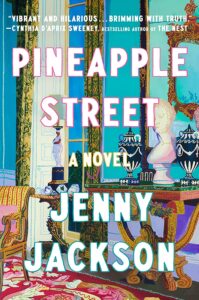
Jenny Jackson, Pineapple Street
Pamela Dorman, March 7
You can’t get any better than Pineapple Street’s marketing copy: “a smart, escapist novel that sparkles with wit.” Sign me up a million times over; it knows what the people want! The novel revolves around three female members of a wealthy Brooklyn family and their choices to either marry into the family, remain within its bubble, or leave it and its privilege behind. As an editor herself, Jenny Jackson is well aware of the demand for voyeuristic, lively novels about the uber-wealthy, one that toes the line between awareness and ignorance, allowing the reader to both identify with and other the characters—think White Lotus, or any recent wildly popular piece of entertainment that follows this trend. We’ll laugh, we’ll cringe, we’ll live vicariously. After years spent working on other people’s books, it’s high time for Jackson’s own work to get the spotlight. –JH
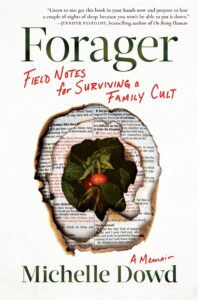
Michelle Dowd, Forager: Field Notes for Surviving a Family Cult
Algonquin, March 7
Michelle Dowd grew up as a third-generation member of a cult called the Field, started by her grandfather atop a mountain in Angeles National Forest (just 100 miles outside of LA). Dowd’s grandfather believed he’d live to be 500, or at least until Doomsday, and as any divinely adjacent patriarch would, he gathered his followers to him and made a home in the wilderness. As Dowd recounts in Forager, she grew up learning all the rough skills required of such a life, but little did she know she was also growing the strength to eventually escape the life she was born into. –JD
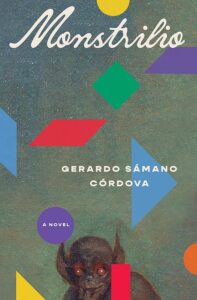
Gerardo Sámano Córdova, Monstrilio
Zando, March 7
Part of a new wave of haunted house horror that continues to expand and redefine the genre, Monstrilio is about a woman who creates a monster from a piece of her dead son’s lung, feeding it bloody sacrifices as it grows into the image of her long-gone child. Her monstrilio is loved, cared for, and wholly monstrous. But are not the monsters among us also capable (and deserving) of love? Read this if you liked Sarah Gailey’s Just Like Home! –MO
Alexander Nemerov, The Forest: A Fable of America in the 1830s
Princeton University Press, March 7
This is may be vain, and definitely cringey, but I really wish I’d written this book. The Forest is what one might dubiously call “a nonfiction novel,” taking as it does the lives, both real and imagined, of multiple early inhabitants of America’s great forests—artists, tradesmen, farmers, poets, enslaved people—and turning them into fictionalized episodes. No matter their station in life, the characters in The Forest—Nat Turner, Nathaniel Hawthorne, Thomas Cole—move through and rely on the woods, for shelter, for fuel, for just about everything. This is history imagined as ecology. –JD
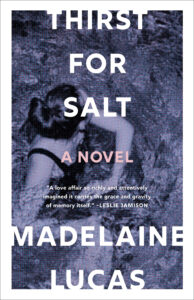
Madelaine Lucas, Thirst for Salt
Tin House, March 7
Lucas is a wonderful writer and I’m looking forward to her debut novel where a woman, finding herself aimless after college in an isolated Australian coastal town with her drifter mother, is drawn into a love affair with an older local man, Jude. “It’s hard to remember now that I was once that girl, lying in the sand in my red swimsuit and swimming late into the day. Sharkbait, he called me.” Told from the perspective of many years later, new questions take shape, unraveling a nostalgic narrative about the summer that shaped her, and the woman she had wanted to become. –EF
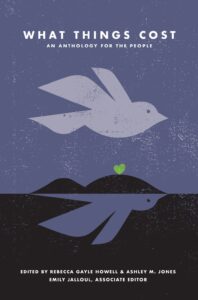
Rebecca Gayle Howell, Ashley M. Jones, Emily J Jalloul (eds.), What Things Cost: An Anthology for the People
University Press of Kentucky, March 7
Another anthology on my list this year is What Things Cost, which collects over 100 contemporary writers musing on labor and solidarity, disenfranchisement and dignity. Featuring the likes of Natalie Diaz, Ocean Vuong, Victoria Chang, and Jericho Brown, it promises to be a major contribution to one of the most significant movements of our time. –ES
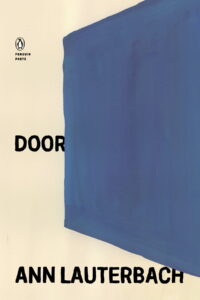
Ann Lauterbach, Door
Penguin Books, March 7
The eleventh collection from Ann Lauterbach, whose Or to Begin Again was a finalist for the 2009 National Book Award in poetry, takes—as its title would indicate—the threshold as motif, investigating the relationship “between the inner landscape of memory, thought, imagination and dream and the outer so-called real world, which increasingly comes to us through technology’s lens, displacing and distorting our sense of intimacy, presence and relation.” –ET
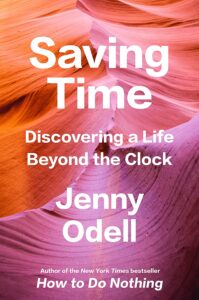
Jenny Odell, Saving Time: Discovering a Life Beyond the Clock
Random House, March 7
Odell’s New York Times bestseller How to Do Nothing was a wonderfully subversive book about the “attention economy” and the power of art and our own interiority. In her new book, Odell takes aim at the corporate clock and a world where “time is money.” Exploring waiting and desire in the natural world, “Odell urges us to become stewards of these different rhythms of life, to imagine a life, identity, and source of meaning outside of the world of work and profit.” –EF

Margaret Atwood, Old Babes in the Wood
Doubleday, March 7
Does this one even need an introduction? Margaret Atwood! You know her! She wrote The Handmaid’s Tale and The Blind Assassin and Oryx and Crake. She famously loves electric scooters and flamethrowers. (Writers—they’re just like you!) From this great mind, a new book is born. It’s her first story collection since 2014’s The Stone Mattress. Old Babes in the Wood promises to plumb the depths of folklore and family relationships. In one story, two sisters wrestle with memory; another takes a microscope to a mother-daughter relationship in which the mother claims to be a witch. There’s something that feels out-of-time about these stories, like tales best told around a campfire. Gather around! –KY
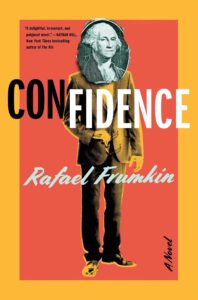
Rafael Frumkin, Confidence
Simon & Schuster, March 7
I’m not narcissistic enough to believe that the Simon & Schuster marketing team wrote the description of Rafael Frumkin’s sophomore novel purely to appeal to me, but if they were trying to get my attention, describing a book as having “the suspense of The Talented Mr. Ripley, the decadence of The Great Gatsby, and the wit of Succession… for anyone who knows that the American Dream is just another pyramid scheme” would be precisely the way to do it. A caper, a queer love story, and a takedown of both wellness culture and the American dream? Sold in the room. –JG
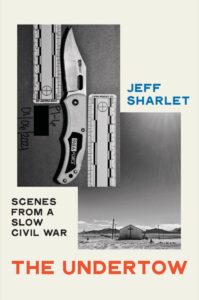
Jeff Sharlet, The Undertow: Scenes from a Slow Civil War
W.W. Norton, March 7
Sharlet’s books require the kind of reportage that feels both immersive and terrifying—his work takes him deep into uncomfortable territory, holding a mirror up to the world we think we live in to reveal another place altogether. That’s what The Undertow promises: a deep dive into the religious dimensions—and fanaticism—of American politics. From a conference for incels to the celebrated martyrdom of a Capitol rioter, Sharlet’s new book will be a must read for everyone looking to understand how the country got to where we are. –EF
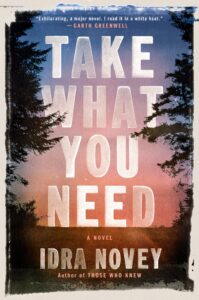
Idra Novey, Take What You Need
Viking, March 14
Idra Novey has a knack for that one specific image. The one you can’t get out of your head, the one that hooks you. In her first novel, Ways to Disappear, that image was of a 60-year-old author climbing a tree and disappearing altogether. In her new novel, Take What You Need, that image will probably be the giant sculptures that our protagonist finds when she comes to clean out her recently deceased stepmother’s house. Leah knew it would be difficult to return to the rural Appalachia she fled, but what she wasn’t expecting to encounter was her beloved (but estranged) stepmother’s art, made with welded metal scraps from the area’s industrial history. In this touching new work, Idra Novey asks questions about how we might contend with our ghosts and how we might repurpose our past. –KY
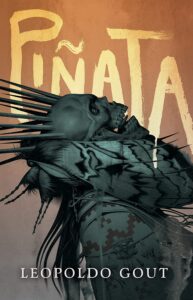
Leopoldo Gout, Piñata
Tor Nightfire, March 14
This stunningly crafted possession novel is rooted in Aztec history and Nahua religious practice, with an ancient Aztec vessel as the conduit for a powerful spirit seeking to avenge the victims of colonialism. Piñata follows an architect and her two daughters, first in Mexico City, then in New York City, pursued by the spirit all the while, as Gout examines the classic possession tale—an adolescent girl, given powers through her liminal state—and reframes it as a response to racism and the erasure of history and culture. –MO
Regan Penaluna, How to Think Like a Woman: Four Women Philosophers Who Taught Me How to Love the Life of the Mind
Grove Press, March 14
Where were all the women philosophers, Regan Penaluna wondered, and what would the field of philosophy look like if women practitioners were treated equally? This book is Penaluna’s response to her own experience of misogyny in American academia. A blend of memoir, criticism, and the biographies of four women who contributed to the field and were largely lost to history, How to Think Like a Woman is a much-needed revelation. –ES
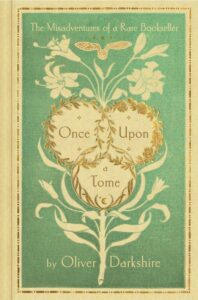
Oliver Darkshire, Once Upon a Tome: The Misadventures of a Rare Bookseller
W.W. Norton, March 14
I once worked with a rare bookseller—a recovering alcoholic who was also a poet—who drank upwards of 20 non-alcoholic beers a day just to take the tiniest of edges off—man, did that guy have stories (none repeatable here). So yes, I’m a sucker for good bookstore yarns, which I expect to find in spades from Oliver Darkshire’s memoir of life at Sotheran’s, one of London’s oldest bookstores, and all the weird, eccentric characters who move through it. –JD
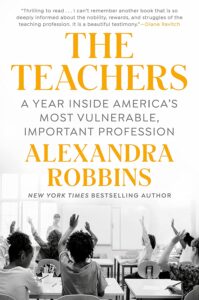
Alexandra Robbins, The Teachers: A Year Inside America’s Most Vulnerable, Important Profession
Dutton, March 14
Let’s be honest, we’ve all had some bad recent years, but not sure anything can hold a candle to what the teacher’s have been through. Society both valorized and demonized them during the pandemic, bowing down to their “essential” work, while also condemning them if they made any move to complain about or criticize the handling of schools during covid. This is, unfortunately, just a dramatization of how they are treated even during a good health year; they are leaned upon, thanked in theory, but ultimately, perpetually expected to go above and beyond with little rightful compensation or understanding of what’s being asked of them. Alexandra Robbins has gone behind the scenes to follow three teachers for a year of their life, revealing the joys and pleasures of the profession, but also the struggles and the fears. We’ll come away from this deep-dive with a true, profound understanding of the labor we take for granted. –JH
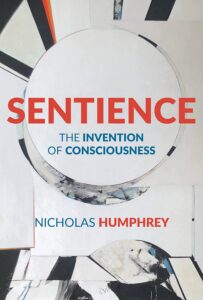
Nicholas Humphrey, Sentience: The Invention of Consciousness
MIT Press, March 14
The history of science has alwyas relied on hard lines and clear categories, and for a long time one of the hardest of those lines was that between sentience and non-sentience. But as theoretical psychologist Nicholas Humphrey explores in Sentience, that line may not be as clear as initially thought, as discoveries in machine-learning, neurobiology, and animal consciousness raise more questions than they answer. –JD
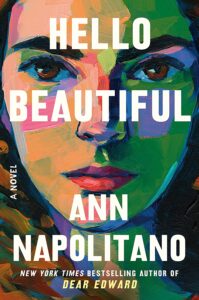
Ann Napolitano, Hello Beautiful
Dial Press, March 14
After her beautiful (and bestselling) novel Dear Edward, about a boy who is the sole survivor of a plane crash, Napolitano returns with another complex family saga, this time an homage to Little Women. William Waters’ home life was marred by tragedy, so when he meets Julia Padavano during his freshman year in college, her spirited nature changes his perspective. What’s more, in her home with her close-knit sisters he finds contentment he wasn’t sure was possible. But tragedy and chaos ensue, and familial rifts threaten everything. Napolitano is a master of examining what binds us to family, what makes family, and how to love in difficult times. –EF
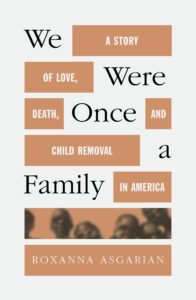
Roxanna Asgarian, We Were Once a Family: A Story of Love, Death, and Child Removal in America
FSG, March 14
If you watched the third season of Atlanta, or just the first episode, you’ll recognize the story of the two white married women who drove themselves and their six Black adopted children off a cliff in 2018. Asgarian’s investigation is an investigation into the chilling case, and ultimately an indictment of the American foster care system, which is just as racist and corrupt as you imagine. –ET
Cathleen Schine, Künstlers in Paradise
Henry Holt, March 14
Set in Los Angeles during the pandemic, but reaching back into 1930s Vienna, Kunstlers in Paradise is a novel of memories. Ninety-three-year old Mamie Kunstler lived alone in her bungalow in LA until her grandson Julian comes to stay: when the pandemic shutdowns begin, they find themselves sheltering together, with time to delve into Mamie’s family history and how her family managed to escape Vienna when the idyllic city turned nightmarish. With glamour and grace, Mamie weaves the tale for Julian, describing the mecca of Jewish artists they lived alongside in sunny California, and the new understanding of home that she and her family came to. Mamie opens up a world of history and also possibility for Julian, allowing him into the shadows of family lore to see it in all its glory and honesty. –JH
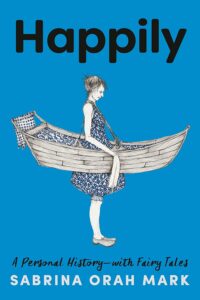
Sabrina Orah Mark, Happily: A Personal History—With Fairy Tales
Random House, March 14
I love Sabrina Orah Mark’s wise gorgeous Paris Review column, so I can’t wait to get my hands on the memoir-in-essays that sprang from it. Happily explores the perpetual relevance of fairy tales to contemporary life. Mark weaves fairy tale logic into stories from her own life to create an insightful examination of both the specific and the universal. In her hands, I look forward to spending time with both the fantastical and the beautifully mundane. –JG
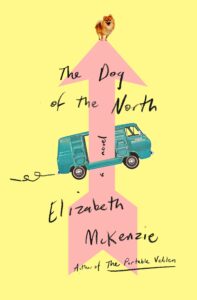
Elizabeth McKenzie, The Dog of the North
Penguin Press, March 14
I was so charmed by McKenzie’s last novel, The Portable Veblen, that in the years since I read it, I’ve periodically googled her to make sure I didn’t miss her next one. At last, the time has come! The Dog of the North, in which Penny Rush, a woman recently marriage-less and jobless, must contend with a mentally unbalanced father, a missing mother, and a mad-scientist of a grandmother (Dr. Pincer!), sounds like it will be every bit as brilliantly daffy as her previous work. I’m of the opinion that we need more screwball comedies in literary fiction, generally, and I’m delighted that McKenzie is doing her part. –JG
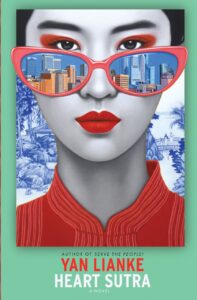
Yan Lianke, tr. Carlos Rojas, Heart Sutra
Grove, March 14
Open up to the first page of any Yan Lianke novel, beautifully translated by Carlos Rojas, and you’ll feel confident that you’re in the hands of an assured and timeless storyteller. There’s always something deeply psychological about his books—like he’s probing at a desperate part of the psyche that most prefer to leave alone. His new novel takes place at a Religious Training Center in Beijing. Disciples of five major religions have gathered for one year of intensive studies. On this hallowed ground, two young disciples (a Buddhist nun and a Daoist master) fall in love. But they’re each harboring their own secrets, private reasons for being there. As these personal desires play out, and as corruption reveals its roots in the institution, our characters will have to grapple with faith—in their studies, in each other, and in themselves—in the face of doubt. And it’s all going to culminate in a tug-of-war contest between the religions. In case it wasn’t obvious, Yan Lianke—in addition to having a wicked imagination—also has a cutting eye for satire. I have faith (sorry) that it’s going to be a good one. –KY
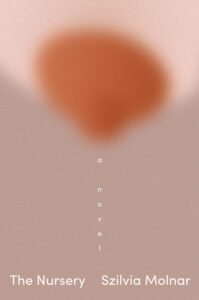
Szilvia Molnar, The Nursery
Pantheon, March 14
In the “maternal prison of her apartment,” a new mother copes with the dizzying dissatisfaction of postpartum life. One of the joys of reading The Nursery goes beyond recognizing these moments and feelings from my own time with newborns—although seeing that in a book is exciting enough—and includes the sentence-level beauty of the tiniest, private moments between a mother and child. “Has there ever been a description of a mother holding her child for hours? Has anyone unraveled the little hours? My state might be a portrayal of the elasticity of time.” Molnar writes through the delicate balance of life-as-art and comes out the other side with a brilliant novel. –EF
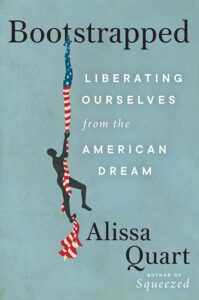
Alissa Quart, Bootstrapped: Liberating Ourselves from the American Dream
Ecco, March 14
The HarperCollins Union has been on strike since November 10, 2022. Literary Hub stands in solidarity with the union. Please consider donating to the strike fund.
Alissa Quart is an essential chronicler of American inequality, and at a moment when the schism between the wealthy and everyone else seems to be getting wider and deeper by the hour, we need her work more than ever. Bootstrapped investigates the American obsession with self-reliance and pulling ourselves up by those titular bootstraps—and the ways in which this myth has dissuaded us from fighting for a social safety net. I look forward not only to reading this one, but also by quoting it in heated conversations for years to come. –JG
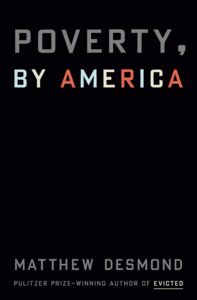
Matthew Desmond, Poverty, by America
Crown, March 21
Desmond’s book about families struggling to pay rent during the 2008 financial crisis, Evicted, absolutely floored me when it was published in 2016 (it also won the Pulitzer). So I am very much anticipating the MacArthur Fellow’s next book, which is about how wealthy Americans benefit from the poverty of their neighbors—and how they work, knowingly or unknowingly, to keep poor people right where they are. This is the kind of awareness we desperately need to start to change this broken, cruel system. –ET
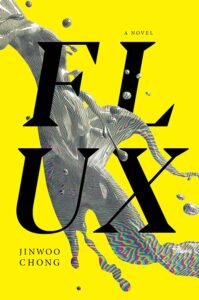
Jinwoo Chong, Flux
Melville House, March 21
Flux is full of surprises and difficult to describe. Three storylines slowly begin to converge into a tale of time-traveling corporate serial killers. Woven into all three stories is a connection to a 1980s detective show featuring a now-canceled star facing damning abuse allegations. If you like stories featuring neo-noir style, corporate corruption, and anything else that wouldn’t be out of place in a slightly more humorous version of the Blade Runner universe, than check this one out! Also notable as an exploration of queer and Asian-American identities. –MO
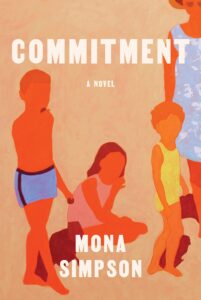
Mona Simpson, Commitment
Knopf, March 21
Nobody writes imperfect parents and fraught family dynamics like Mona Simpson, so her newest novel—which chronicles the struggles of a family after its matriarch, Diane, is sent to a state hospital in 1970s California after a major depressive episode. The novel follows Diane’s three children as they struggle with the fallout from their loss. If it’s anything like Simpson’s other work, this one promises to be brilliant, harsh, merciful, and devastating. –JG
Victor LaValle, Lone Women
One World, March 21
Victor LaValle’s last novel—2017’s urban horror/fantasy The Changeling—was one of the most brilliantly imaginative and genuinely terrifying novels of the last decade. His hotly anticipated follow up, Lone Women, looks to be every bit as eerie and expansive as Apollo Kagwa’s New York odyssey. Set in the early years of the 20th century, Lone Woman follows Adelaide Henry, a young woman with a horrifying secret who, in the wake of her parents’ deaths, flees to Montana to become a homesteader. From Inland to Outer Range, I love a good magical western, so this one will be going right to the top of my TBR pile. –DS
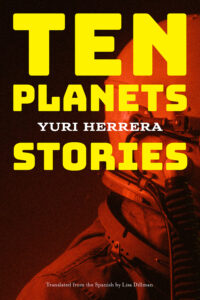
Yuri Herrera, tr. Lisa Dillman, Ten Planets
Graywolf Press, March 21
Signs Preceding the End of the World (also translated by Dillman) was one of my favorite story collections of the previous decade. Herrera’s writing moves through different registers with ease, some familiar, some uncanny: the noir, the metaphysical, the self-aware, the brutal… all of it unlikely and beautiful. In Ten Planets, Herrera shifts from the fantastical (monsters and aliens) to the eerily materialist (a bacterium achieves sentience) like a boy flipping through the pages of a beloved comic book: with delight and conviction. –JD
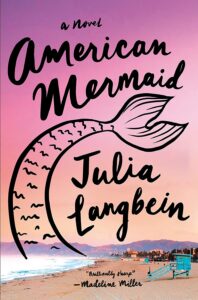
Julia Langbein, American Mermaid
Doubleday, March 21
Julia Langbein’s debut novel, which Madeline Miller calls “brilliantly sharp, funny, and thought-provoking,” tells the story of a broke English teacher whose feminist novel becomes a surprise hit, prompting her to move to L.A. to adapt it for the big screen. Part Hollywood satire, part magical realist myth, this one sounds like the wonderfully strange, extremely funny page-turner of my dreams. –JG

Esther Yi, Y/N
Astra House, March 21
A few months ago, my boyfriend dropped The Paris Review into my lap and said, “You have to read this story.” I’m not always good at following through with these recommendations, so he proceeded to stand there until I did. And, reader, I loved it. The story in question was “Moon” by Esther Yi, which follows a young Korean American woman as she becomes increasingly obsessed with a K-pop group. She starts off skeptical, rolling her eyes whenever her fangirl roommate talks about them with such open love. She is dragged to a concert, where she is, inevitably, converted.
When Esther Yi paints a picture, she does it with bright, bold brushstrokes. Listen to this: “It was the neck that disturbed me. Long and smooth, it implied the snug containment of a fundamental muscle that ran down the body all the way to the groin, where, I imagined, it boldly flipped out as the penis.” What? Don’t you need more of that? Good news: that was only the first few pages of what is sure to be a wild ride of a novel. Our unnamed narrator starts to write fanfiction, placing you, dear reader directly into the action. When her favorite musician, Moon, suddenly retires, she journeys to Seoul to find him—and maybe herself in the process. (What are our earnest obsessions, after all, if not some sort of mirror into ourselves?) Please take this blurb as me dropping this story/upcoming book in front of you with similar urgency. –KY
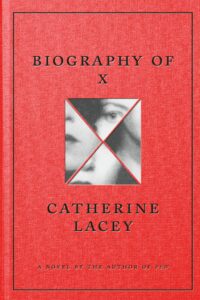
Catherine Lacey, Biography of X
FSG, March 21
Catherine Lacey (The Answers, Pew) is one of our most innovative contemporary authors and her new novel, Biography of X, sounds like her most ambitious and intriguing work yet. When X, a mysterious and iconoclastic artist in an alternate US, falls dead in her office, her grieving widow, CM, sets out to write the biography of the woman she adored and idolized. To understand her late partner, she must immerse herself in the history of the Southern Territory, “a fascist theocracy that split from the rest of the country after World War II, as it is finally, in the present day, forced into an uneasy reunification.” An epic, decades-spanning literary mystery featuring cameos from David Bowie, Tom Waits, Susan Sontag, and Kathy Acker, Biography of X has been described as having “the breadth of a 19th century classic with the propulsiveness of a psychological thriller.” –DS
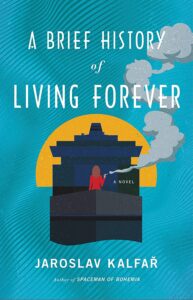
Jaroslav Kalfar, A Brief History of Living Forever
Little, Brown, March 28
From the author of Spaceman of Bohemia, Kalfar’s new novel is a sci-fi/post-apocalyptic family romp where two long-lost siblings must save their mother Adéla from a terminal illness. Adéla had left her native Czech village for America to reunite with her daughter Tereza, the star researcher at VITA, the biotech company working to discover the key to immortality. A thoroughly original story from a writer to watch. –EF
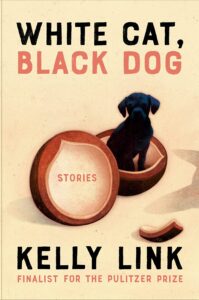
Kelly Link, White Cat, Black Dog: Stories
Random House, March 28
Trying to write this blurb, I keep thinking of A.J. from Empire Records, trying to figure out how to declare his love for Liv Tyler. Say it with me, old millennials: “You know that feeling when you get out of a warm bath . . . well . . . you make me feel like a bath?!?!” Disgust and shame. But this story collection really does feel like a bath, in the sense that it hits all my fairy tale pleasure sensors, and all my novelty pleasure sensors too. (This would be fairly standard for a Kelly Link book, as you probably know.) It’s like a very spicy, kind of scary, whip smart, winking . . . bath. That is, exactly what I want in my life at all times. –ET
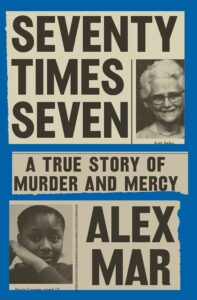
Alex Mar, Seventy Times Seven: A True Story of Murder and Mercy
Penguin Press, March 28
The only way this country will ever free itself of the moral stain that is capital punishment is through stories like the one Mar tells in Seventy Times Seven: of individual compassion and moral courage. In 1985, a Black teenager named Paula Cooper killed an elderly white woman named Ruth Relke, beloved in her hometown of Gary, Indiana. Cooper was given the death sentence, but before she could be murdered by the state, Relke’s grandson Bill very publicly forgave Cooper, setting in motion a campaign to save Cooper’s life that would go all the way to the Vatican. –JD
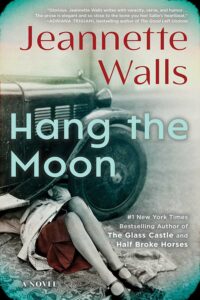
Jeannette Walls, Hang the Moon
Scribner, March 28
Jeannette Walls was, and is, a force to be reckoned with—her memoir The Glass Castle was read by just about everyone and their mother, and was featured on the New York Times bestseller list for eight straight years. While Hang the Moon is a historical fiction novel rather than a memoir, Walls has indisputably positioned herself as a writer of great worth, and any work of hers is one to be appreciated. This one focuses on Sallie Kincaid, a young girl in Virginia during Prohibition, whose mother died when she was young and lives with her father and his new wife and son. The family is rife with secrets, and past and present trauma that Sallie must contend with as she comes into her own as a woman and bootlegger during the dry crusade. –JH
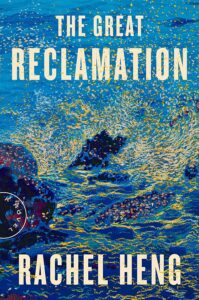
Rachel Heng, The Great Reclamation
Riverhead, March 28
Heng’s novel is an epic love story set against war and colonialism: Ah Boon and Siok Mei live in a coastal-fishing village in Singapore in the waning years of British rule. As they come of age, their lives are intertwined with great sweeps of history—World War II and Japanese occupation. A novel about the tensions of homeland and nationhood, this promises to be a must-read. –EF
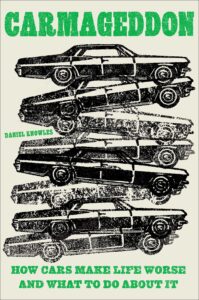
Daniel Knowles, Carmageddon: How Cars Make Life Worse and What to Do About It
Abrams, March 28
As someone who learned to drive at what Americans would consider a disgracefully late age (cough…thirty-two…cough), and who recently spent time attempting to navigate the Ballardian Texas state highway system (which contains a twenty-six-lane freeway), I am excited to read, and nod enthusiastically along with, this anti-car polemic by Economist journalist Daniel Knowles. I’m doing so even as I read the promotional copy: “Over the past century cars have filled the air with toxic pollutants and fueled climate change. Cars have stolen public space and made our cities uglier, dirtier, less useful, and more unequal. Cars have caused tens of millions of deaths and injuries. They have wasted our time and our money.” Hear hear. –DS
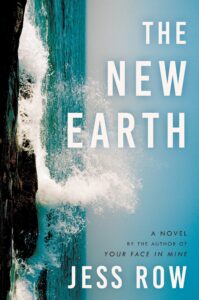
Jess Row, The New Earth
Ecco, March 28
The always-perceptive Jess Row is back with a complex family epic, in which a Jewish clan is torn apart when its patriarch barely dodges disbarment, its matriarch tells her children that her father was Black, and their youngest child is killed by a sniper while protesting the Israeli occupation of Palestine. But years later, when their middle child, Winter, gets married, the whole family must come back together, despite difficulties both personal and political. –ET
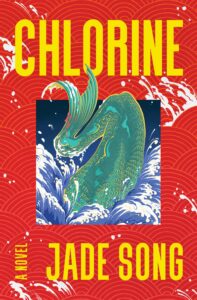
Jade Song, Chlorine
William Morrow, March 28
The HarperCollins Union has been on strike since November 10, 2022. Literary Hub stands in solidarity with the union. Please consider donating to the strike fund.
Jade Song’s debut novel is a coming-of-age story about Ren, a teenage competitive swimmer who will do whatever it takes to become… a mermaid. Drawing comparisons to The Pisces and The Vegetarian, Chlorine is billed as an unsettling sendup of the pressures of girlhood, queerness, and being a first-generation immigrant in America. I can’t wait to see what Song does with this irresistible premise. –ES
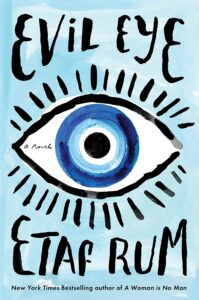
Etaf Rum, Evil Eye
Harper, March 28
The HarperCollins Union has been on strike since November 10, 2022. Literary Hub stands in solidarity with the union. Please consider donating to the strike fund.
The bestselling author of A Woman is No Man is back with a novel about a Palestinian woman who thinks she has finally constructed the perfect life—away from her conservative family, living in the suburbs, teaching at a local college, raising her two daughters much differently than she herself was raised. But things (as they tend to) begin to go awry, and Yara’s mother blames a family curse. “I was mainly inspired by the Evil Eye—a supernatural belief in a curse brought upon by a malevolent glare—which was a common superstition in my household growing up, as well as my Palestinian-American community in Brooklyn,” Rum told Today. But what, for Yara, does that even mean? –ET
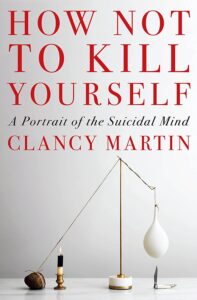
Clancy Martin, How Not to Kill Yourself: A Portrait of the Suicidal Mind
Pantheon, March 28
Based on his viral HuffPo essay, “I’m Still Here,” Martin’s new book takes a frank look at his multiple suicide attempts, providing an “intimate depiction of the mindset of someone obsessed with self-destruction.” Touching on the thinking and writing of other writers who have committed or considered suicide, as well as what the history of philosophy has to say for and against it, Martin’s book is a critical memoir diving headfirst into our darkest and most taboo desire. –EF









